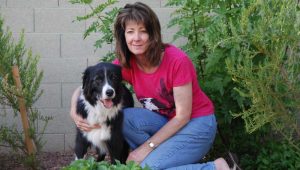
On April 13, six volunteers from Arizona Border Collie Rescue filled up three vans with gas, made sure they had enough crates, leashes, collars and dog treats, and left the Valley on a road trip of a lifetime.
The six, including south Tempe resident and volunteer Laurel Todd, drove about 700 miles to Odessa, Texas, where they picked up 21 border collies that had been recently taken out of a puppy mill in nearby Jefferson.
Only a few weeks earlier, the breeding operation was shut down when its owner was hospitalized. Local Humane Society employees went to the property and discovered 167 living and 16 deceased border collies on 30 heavily wooded acres.
Some were puppies, some were adults, others were elderly. Many were ill, living in stacked-up, filthy metal crates, their paws spread open from trying to balance on the rusty metal wire. All were sad, scared, hungry and lonely.
Border Collie Rescue of Texas was called in to help, and, realizing there were more dogs than its members could possibly handle, the group contacted other Border collie rescue organizations, including the one in Arizona.
Kelly Quinn, president and co-founder of ABCR, knew the south Tempe-based rescue group had to help. Quinn, a Phoenix resident, sent out emails to dozens of volunteers, asking who would be willing to foster one of the Texas dogs. Replies came in from throughout the state from people wanting to assist.
Todd said that she was inspired to help in part by the recent tragic events in Japan.
“After the Japan tsunami, I had just said to myself that the next time there was some type of national disaster, I wanted to go help with the dogs,” she said.
“Then I heard about this puppy mill situation. I didn’t think I was going to be able to go because of work, but when the dates changed, everything worked out.”
After about an hour of assembling and fitting crates into the three vehicles, Todd and the others hit the road. They arrived in Odessa late that same night, and spent the next day doing paperwork until the dogs arrived late that afternoon.
“We were all very excited to see the dogs. We had pictures of the ones that we were getting and knew the names that (the Texas group) had assigned to them. So when we saw them in the kennels, we recognized them and could call them by name,” Todd said.
“It was wonderful when some of them were standing up in their kennels with their tails wagging, but it still didn’t make up for the sheer terror on the faces of others.”
Todd said it took almost two hours to transfer the scared and confused dogs into the volunteer vans from Arizona and to get the needed paperwork organized.
“Some of the dogs were terrified and were afraid to come out of the crates,” she said. “We had to be very careful putting not only a collar and leash on them, but also a slip collar in case the collar was too loose.”
Around 6 p.m. on April 14, Todd and the others started the long journey back to Arizona along with their precious cargo: Amber, Grace, Eve, Sarah, Sierra, Libby, April, Suzy, Kruz, Tucker, Carson, Finley, Chip, Princeton, Spirit, Beacon, Lyric, Vivie, Jesse, Dylan and Teddy.
They arrived in Tucson at about 5 a.m. on the 15th, immediately dropping off a few of the Texas dogs to their pre-arranged foster homes, then off to AZ Dog Sports in Scottsdale at around 7:30 a.m. to a crowd of cheering people.
“It was very emotional for all of us. I think we were all crying, not to mention we were exhausted,” Todd said.
Todd, who estimates she has fostered at least two dozen dogs over the years for the Arizona rescue organization, is currently taking care of Suzy, who she said is about seven years old. Although she is doing “fairly well,” Suzy was recently diagnosed with vaginal cancer, possibly a result of being bred over and over.
“She is a sweet dog. She still has a way to go emotionally—she still won’t ‘come’ to me, or won’t approach for a pet,” Todd said, adding that Suzy’s front canines appear to be filed down, probably so she wouldn’t bite while breeding.
Todd said that, overall, the “Texas 21,” as they are now known, are doing well. Most are shy but none seems to be showing signs of aggression toward people or dogs. Many crave attention from their foster parents. After living outside all their lives with virtually no love, care, or companionship, the dogs are happily getting used to things many other dogs take for granted, like living inside a home, getting belly rubs, playing with toys, eating regular meals and drinking fresh, clean water.
Todd said she hopes people will think twice about buying a dog from a puppy mill. She wants to emphasize that not only do the puppies often come out with serious health issues, but the adult dogs that are left behind to breed over and over are also scarred emotionally and physically.
“It is great to know that we are helping these dogs, but heartbreaking to know that this is still going on throughout the country,” she said.
“People need to know that when they get a dog from a breeder it could be someone like (the Texas mill operator); they have a public-facing location that is nice and clean and another location where they are warehousing dogs.
“If people could see the conditions that these dogs were living in, maybe they would think twice and consider a rescue instead.”
For more information on Arizona Border collie Rescue, the Texas dogs, or to make a donation, visit: http://www.azbordercollierescue.com/texas21.asp

